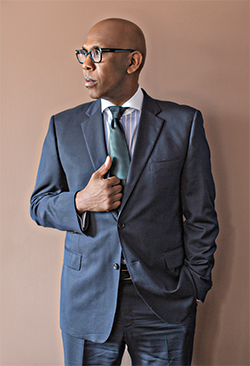
What the Story of Cyntoia Brown Should Teach Us
Video Courtesy of PBS
Last month, Cyntoia Brown Long was released from a Nashville prison after serving fifteen years of a life sentence for killing a man who solicited her for sex. Her story sparked a national conversation on how the justice system deals with abuse and sex trafficking victims who act in self-defense.
According to a study published by the Vera Institute of Justice in 2016, 86 percent of women in jail are survivors of sexual violence. Black women are incarcerated at around double the rate of white women.
Such cases speak to a large need in the justice system to recognize when an individual’s actions are the result of neglect, abuse, and circumstance.

Bishop Joseph W. Walker III
Bishop Joseph W. Walker III of Mt. Zion Baptist Church lobbied for clemency in Brown’s case. In his book Restored at the Root, he wrote about what Americans—and the church—can learn from stories like Brown’s:
What causes people to choose an oppressive mechanism as a remedy?
Too many use a nonredemptive approach to deliverance that is in conflict with the teaching of Jesus. Rather than use a model that liberates the man, they seek to tie him up further. Our justice system is an example of how we as a society have practiced putting chains on people and isolating them in places such as jails and prisons. We have created social systems designed to bind people instead of seeking methods to restore those who are engaged in behavior that often leads to criminal acts, especially when the behavior begins when they are teenagers or young adults.
Although many situations merit harsh consequences, there are countless cases where a different approach would bring about a more restorative result. People who are plagued by systematic oppression caused by social inequities such as unequal education and impoverished neighborhoods that are riddled with crime, drugs, and sex trafficking more frequently find themselves in the criminal justice system.
Over the years as a pastor, I have sat in courtrooms and visited jails and prisons to support my church members or the relatives of members when they found themselves face to face with the legal system. One of the most critical cases I have been intimately involved in is that of Cyntoia Brown. Her story was both tragic and complicated.
A victim of sex trafficking, prostitution, and abuse, Cyntoia Brown was found guilty of murder and sentenced to life in prison, having been tried as an adult for a crime she committed in 2004 at the age of sixteen. In December 2018, her case was appealed to the Tennessee Supreme Court, which ruled that she would be eligible for release after she serves fifty-one years in prison.
I met the governor shortly after he took office, and I had worked on a few of his initiatives that were important to us both. We had been friends for seven years and had mutual respect. I felt I was in a pivotal position to speak to him concerning this case. I requested a phone call with him in the eleventh hour of his tenure as governor. So many people had petitioned for Cyntoia’s release, and her amazing legal team had worked tirelessly on her appeals and were in constant contact with the governor. I chose to add my voice to a chorus of others advocating for her future.
On January 7, 2019, the governor decided to grant her clemency. I was honored to play a small role alongside so many others in advocating for this. I share this to provide a further understanding of my desire to see people like Cyntoia given a second chance at life. She was a teenager who had experienced much abuse in her life, and as a result, she became caught up in a situation that led to her committing a criminal act through which a life was lost and she was imprisoned.
Her conviction, like countless others’, is part of a larger systemic problem with incarcerating people who are often defenseless against the social ills of their community and end up engaging in criminal activity because they see no other options.
According to Michelle Alexander, author of The New Jim Crow, “Mass incarceration is designed to warehouse a population deemed disposable—unnecessary to the functioning of the new global economy.”
People who are deemed disposable are placed on the margins, put in chains or handcuffs, and made to live in the dead places of our prison systems. There is a need for social reform to take place, more specifically in systems that seek to chain and contain instead of helping to restore those who have endured broken situations that led to a life in bonds.
My belief in the power of restoration over simple restraint led me to be an advocate for Cyntoia Brown’s clemency. As we look forward to her release in August 2019, my church and I plan to give her our full support as she enters the next phase of her life. We will walk with her through her years of probation, help her with job placement, and assist her in her efforts to be a voice for others who endured some of the same hardships.
Cyntoia’s case is just one example of how the current systems in place allowed for only one way of handling a person deemed disposable—to put them in bondage and lock them up. Yet the question must be asked, If that method is successful, why do our prisons continue to expand?
If we truly desire to restore order to our communities, cities, states, nation, and world, we must be intentional about our efforts to combat the forces of darkness that come against the world in which we live. Dealing with spiritual warfare is the responsibility of not just the individual but also the community at large. The church must be careful not to replicate the model of the Gadarenes:
He lived among the tombs. And no one could constrain him, not even with chains, because he had often been bound with shackles and chains. But he had pulled the chains apart and broken the shackles to pieces. And no one could subdue him. Always, night and day, he was in the mountains and in the tombs, crying out and cutting himself with stones (Mark 5:3–5, MEV).
When we tie people up, it is an attempt to control. We push things away or sweep them under the rug in an attempt to maintain what we hold sacred. Yet we run the risk of sacrificing the deliverance of our brothers and sisters to keep from disrupting our “sacred” systems. We have no idea how many people are hurting privately among us but are being pushed away because we don’t like their issues.
We must be willing to persevere through the process while seeking new approaches. Never lose hope. Perhaps God is using this moment to awaken a fresh vision in your church or ministry to reach those who are hurting and bound. They are not disposable to God; they are dearly loved.
Bishop Joseph W. Walker III, DMin, is the senior pastor of the historic Mt. Zion Baptist Church of Nashville. His book Restored at the Root: Get to the Source of Social, Emotional, and Spiritual Struggle released August 6, 2019. Walker serves as the international presiding bishop in the Full Gospel Baptist Church Fellowship International. He received a master of divinity degree from Vanderbilt University and a doctor of ministry degree from Princeton Theological Seminary. He holds two honorary doctorates, from Meharry Medical College and Southern University. Bishop Walker is a regular guest on The Rickey Smiley Morning Show radio program and has been a guest on CNN, CBS This Morning, and The Roland Martin Show. He and his wife, Dr. Stephanie H. Walker, have two children.
